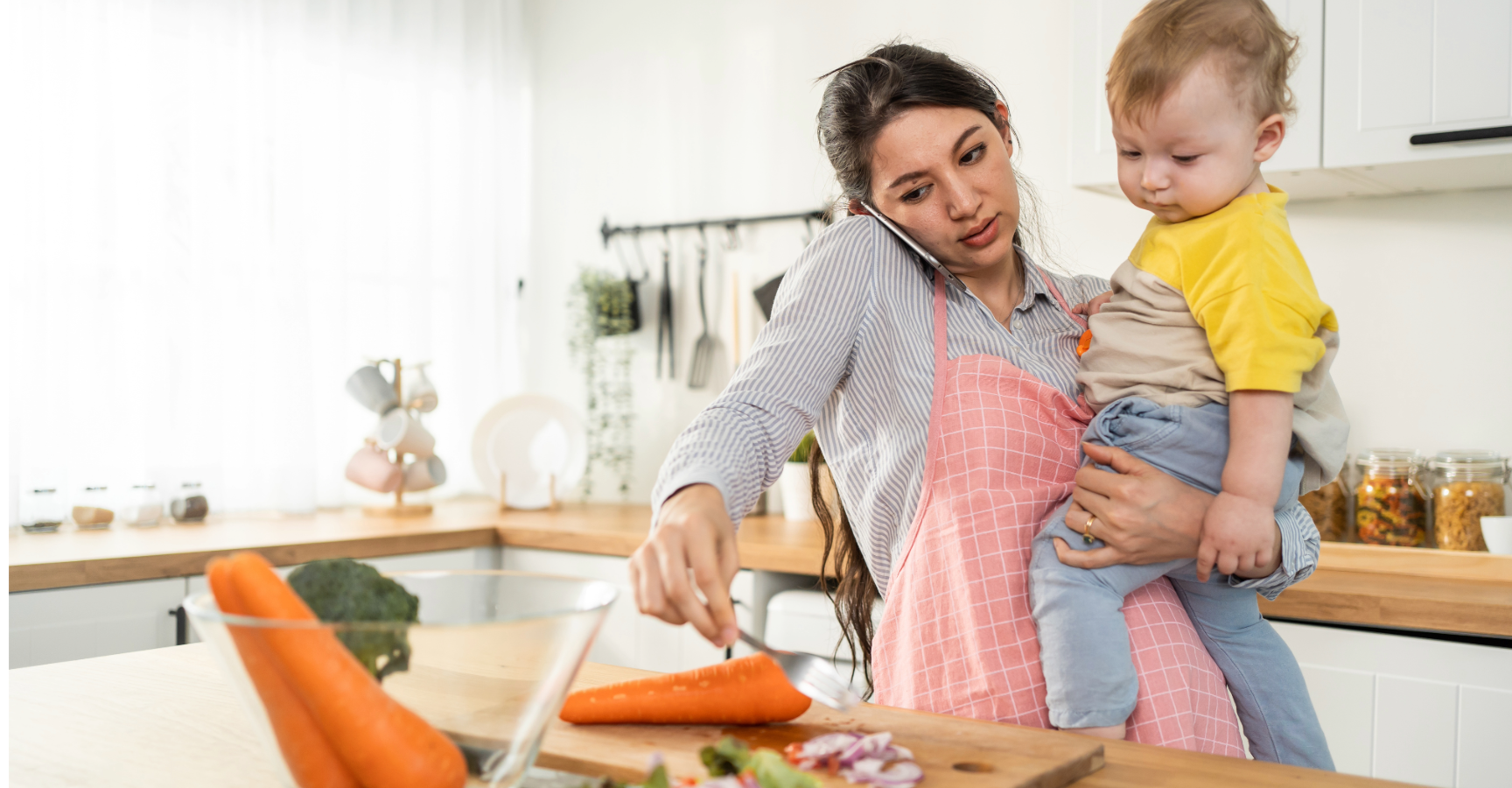
Being a parent is the best job in the world. But it's not without its challenges. The joy parenthood also brings with it big responsibilities and a lot of additional work, particularly for the primary caregiver.
The physical tasks of parenting - the never-ending laundry, constant cleaning of sticky fingers and surfaces, and battle of tidying up toys- are well understood. However, the invisible mental load is finally getting its time in the spotlight.
Keeping track of everyone’s appointments and activities and ensuring everyone gets to where they need to be, on time, and with everything they need, on a daily basis can be a big workload on its own. Add in things like, researching and supporting children’s development, supporting children through big emotions, managing illnesses, helping children navigate transitions, keeping track of clothing and shoes for growing bodies across the seasons, and all the planning and effort that goes into creating fun and special memories for children …. and it really starts to add up.
Not to mention, many of the physical tasks have an invisible mental load attached. What may look like an hour of work cooking dinner, has untold hours of hidden mental work in planning and decisions.

Behind cooking one meal is likely to be:
- Researching ideas and making decisions about what to make, taking into account any allergies and dietary requirements, preferences of family members and variety
- Considering how to meet the nutritional needs of the family, which may range from finding creative ways of hiding veggies for fussy eaters through to deciding the best way to encourage children to try new foods
- Considering budgets and cost-effective ways of using ingredients. This often means considering this meal as part of the weekly meal plan.
- Planning and making time to buy the ingredients. This may require trips to multiple stores while juggling other commitments or arranging deliveries and ensuring you’ll be home within a reasonable time to put perishable food away.
- Planning and undertaking food preparation ahead of time and juggling other commitments, to ensure dinner will be ready on time.
The invisible work doesn’t stop once dinner is served. Sometimes encouraging children to sit down long enough to eat a meal is a challenge in and of itself. There may also be a need to soothe emotions and work through the best way to navigate children refusing to eat the meal you’ve spent ages preparing.

And the mental load is relentless. There is no clocking off at 5pm. Even while seemingly ‘resting’, often your mind is still running through endless to-do-lists and things you need to remember. Anticipating, planning, deciding, organising and responding to all the practical and emotional needs of children and a household can be an exhausting mental and emotional workload.[1]
Fortunately, there is a growing recognition of the importance of self-care for parents, particularly the primary caregiver. We know that to be the best parent you can be, parents themselves need to have their own basic needs met and look after their wellbeing. In the same was as you need to put your own oxygen mask on before you can help others. However, too often this well-intentioned premise is pitched as ‘taking a few hours off to do something for yourself’ and does nothing to address the core issue of the mental load.
While taking time out is essential, without also tackling the workload, it does little to improve long-term wellbeing. It can be a challenging to fully enjoy child-free time with friends or a walk, when you know you have a mountain of tasks and decisions to return to.
So, how do we lighten the load? Systemic societal changes are required to properly tackle this issue, including valuing unpaid work, but there are also steps we can all take to help ease the pressure.
Outsource tasks where you can
Outsourcing some tasks, particularly where this includes both mental and physical load can make a big difference.
Engaging a regular cleaning service not only helps tackle the not-so-fun cleaning jobs but also reduces the planning required to juggle cleaning while taking care of children and other home or work commitments. This can be particularly challenging when children are young and there are cleaning tasks which are unsafe or unhygienic for children to help with. Toddlers trying to grab toilet brushes or ‘play’ with cleaning products is the last thing you want to be worrying about when trying to scrub the shower.
Purchasing pre-prepared food from reputable brands who provide wholesome and nutritionally dense food, can also be a helpful option. Having nutritious ready-made meals and snacks on hand helps alleviate the planning and organisation, as well as time needed to prepare food. It can also take a weight off your mind knowing there is food in the freezer for days which don’t go to plan… this is pretty every day with kids, but the ones which really go pear-shaped.
How this would works best depends on your family. Purchasing one or two pre-prepared meals could help take the pressure off mid-week, or having healthy pre-prepared lunchbox items may be what’s most needed to help take the pressure off childcare or school mornings. Having a range of finger food options in your freezer on stand-by which can be paired with a side for a well-rounded meal or used on their own as a quick and healthy snack may also be helpful. Audrey & Alfie's dietician-designed snap frozen meals and finger food for babies, toddlers and older children can take your family from breakfast through to dinner and everything in between, as well as a range of healthy lunchbox options.
Evenly distribute the physical and mental load in your household
Sharing this load between parents, whether living in the same household or separated, is essential. There are now a range of great resources to help make the hidden mental load more visible which can help support a more even distribution of tasks. This doesn’t mean splitting every task 50:50. There will be tasks each of you prefer and what you each do may ebb and flow based on other things going on in your life.
What’s important is that both parents have a good understanding of the physical and mental tasks and contribute to what’s needed in an equal partnership. Maybe you do most of the cooking. Or maybe your partner does. Either way, it’s a time-consuming task and needs to be factored into the overall workload of having kids. Along, of course, with the laundry, cleaning, drop-offs and pick-ups, and never-ending scheduling of appointments.
One useful resource is, Fair Play Life. It helps to identify unpaid, invisible work and encourage constructive conversations and a system for how to divide up household tasks fairly among partners.
Involve children in household tasks from the start
The tension between spending quality time with children or tackling the endless ‘to-do-list’ is an ongoing challenge, regardless of whether you’re in some form of paid employment or at home. Too often in the rush to get through our lists, it feels easier to occupy children while focusing on getting chores done and then build in time for play and connection separately. This is often accompanied by large amount of guilt and questioning whether you’re spending enough time with children and falling behind on other tasks.
But these two things don’t need to be viewed as oppositional. In fact, engaging children in everyday household tasks has multiple benefits both for children and parents. And getting children involved from a young age brings the most benefits.
Reframing how we approach chores and seeing these as opportunities to build connection with our children, foster their social and emotional development, and build literary and numeracy skills can help relieve the tension. While many tasks will inevitably take longer when children are young, it will go a long way towards alleviating the feeling of being torn between how you spend your limited time – which cannot be underestimated.
Involving children in age-appropriate chores, like cooking, feeding pets and gardening (with supervision of course) from an early age helps children become active contributors to the family as they get older.[2],[3] We all know toddlers and preschoolers love to help. There’s a reason why so many of the most popular toys are pretend kitchens and cleaning sets. This strong desire to help doesn’t usually last as kids get older. But there’s clear evidence that investing the time to involve young children in chores at the time when they are enthusiastic, albeit not overly helpful, pays off in the long term. It helps set them up to be much more willing to help out as they get older and can take on these tasks independently.
And more importantly, there is mounting evidence that children actively helping out with daily tasks is good for their wellbeing as well setting the up for success later in life. Feeling they are making a meaningful contribution helps fosters a sense of belonging, builds their self-esteem and resilience, it also helps build life skills, problem solving, emotional regulation and memory. [4],[5]
For specific tips on meal preparation you may also want to check out our blog 'Cracking the 'what's for dinner?' dilemma: Tips to tackle decision fatigue'.
[1] L Dean, B Churchill & L Ruppanner (2021): The mental load: building a deeper theoretical understanding of how cognitive and emotional labor overload women and mothers, Community, Work & Family, DOI: 10.1080/13668803.2021.2002813
[2] E M White, M D DeBoer; RJ Scharf ‘Associations Between Household Chores and Childhood Self-Competency.Journal of Developmental & Behavioral Pediatrics, 40 (3), 2019, pp 176-182. doi: 10.1097/DBP.0000000000000637.
[3] M Rossmann, ‘Involving children in household tasks: Is it worth the effort?’ The University of Minnesota, 2015.
[4] A Trounson,’ Why helping at home is good for kids, Pursuit, The University of Melbourne, 2017.
[5] D L. Tepper, T J Howell and P C Bennett,’ Executive functions and household chores: Does engagement in chores predict children's cognition?’, Australian Occupational Therapy Journal, 69 (5), 2022. Pp 511-647, doi: 10.1111/1440-1630.12822



Comments (0)
Back to Mental Load